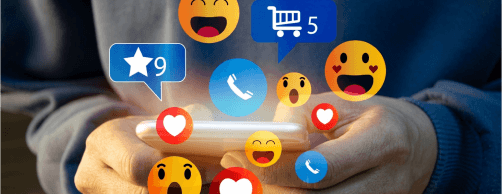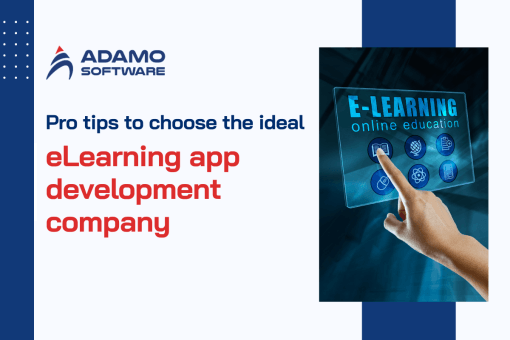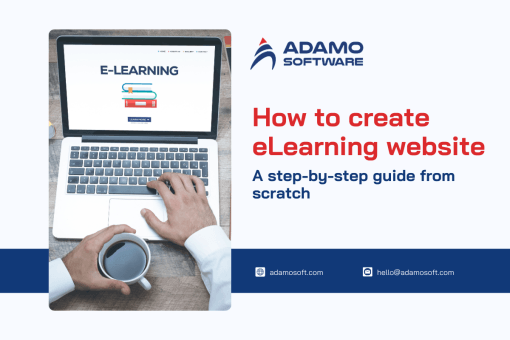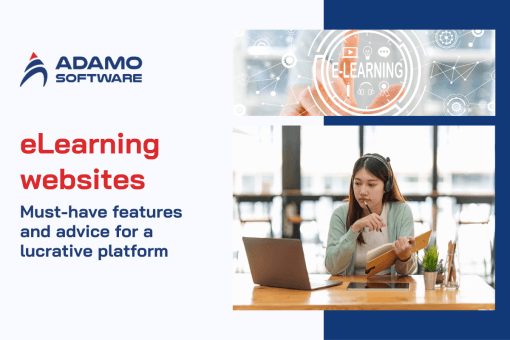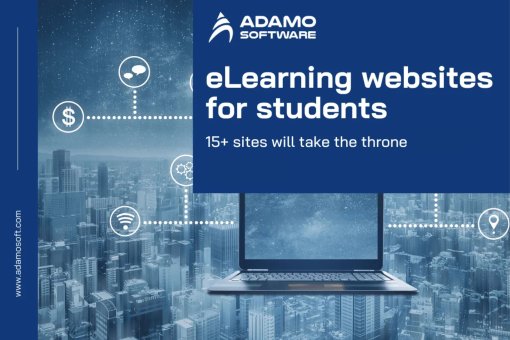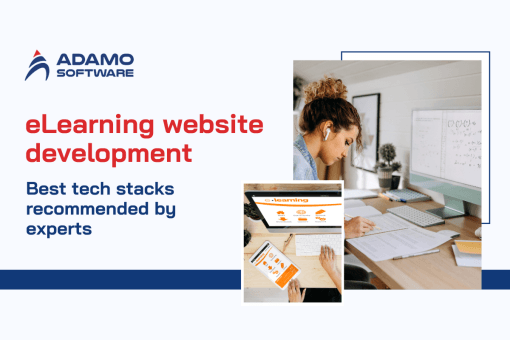Explore Top 8 Healthcare Learning Management System Software for Practical Users
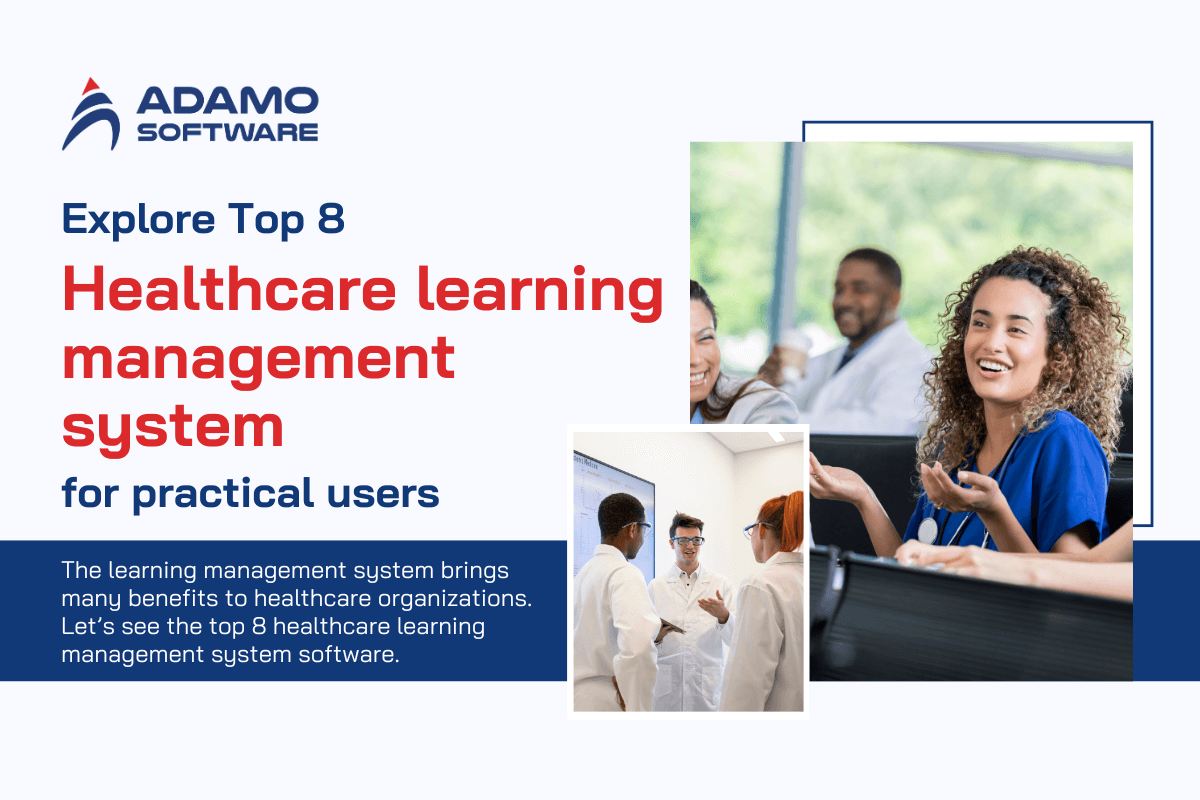
Currently, learning management system (LMS) software is becoming popular for businesses operating in various fields. The healthcare industry, which needs to adapt to new trends and methods to stay at the forefront of medical practices, is one of them. Thanks to the LMS system, the entire process of training staff in healthcare facilities will become simpler. LMS system provides a variety of healthcare courses and enables hospital staff and healthcare professionals to learn anytime, anywhere. Besides, the LMS system can bring many other benefits to medical facilities. With this system, healthcare centers can save on training costs, enhance training efficiency, and comply with healthcare policies and regulations. So, what are some reliable software that healthcare organizations should use? Let Adamo Software recommend the top 8 healthcare learning management system software for practical users.
Through this blog post, you will find detailed information on some requirements of the healthcare LMS system. These requirements are related to content management, security and regulation compliance, and scalability. You will also learn some main features of the top healthcare LMS software. Additionally, how to select the right medical LMS will also be discussed. All information has been carefully researched. So, let’s read our post to find useful pieces of information.
I. Requirements of Healthcare Learning Management System (LMS)
The healthcare learning management system must meet strict requirements to ensure efficiency and security. A useful LMS for healthcare must ensure delivery of rich content, protect sensitive data, and provide professional training and certification. Besides, personalized learning experiences must be optimized, and the system must be flexible, mobile-friendly, and scalable. Let’s get more insights on each requirement with Adamo Software!
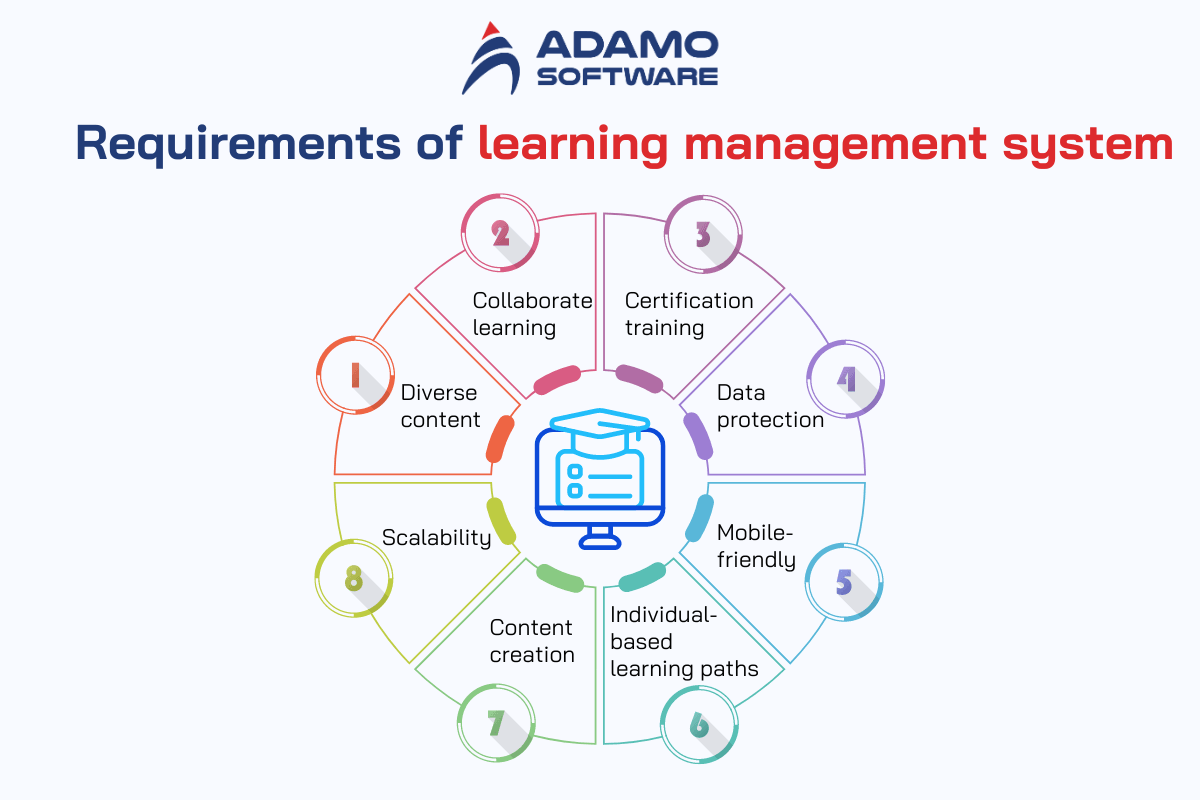
1. Diverse content management
Content plays a vital role in healthcare training. Therefore, the ability to manage diverse content is a mandatory requirement for LMS in healthcare. A good healthcare learning management system software can manage and deliver learning content in multiple formats. For example, they can include instructional videos, tests, study materials, and real-world simulations. This helps to meet the diverse learning needs of healthcare professionals.
The LMS in healthcare optimizes the organizing process and provides learning content efficiently with a centralized platform to manage all documents and courses. With diverse content management capabilities, trainers can create, edit, and update learning documents, and distribute them quickly to learners. Thanks to this, medical staff can access the latest documents and knowledge.
2. Data protection
Data protection is among the essential factors in ensuring the security and privacy of sensitive information. The Health Insurance Portability and Accountability Act (HIPPA) is one of the laws that the system must adhere to. This law establishes rules for access, authentication, storage, audit, and conversion of electronic health records. The information protected under HIPPA includes information about the patient’s health care status, providing health care services to an individual, and payment information. The system can ensure information security and build user trust by encrypting data, controlling access, and monitoring user activity to prevent unauthorized access.
3. Certification training
A healthcare learning management system must have a certification training feature. This provides specialized courses and examinations for healthcare professionals to achieve the necessary certifications. The system monitors the learning process, automatically assesses, and grants certificates when the learners finish a course. The course may relate to specialized medical skills, safety regulations, or international medical standards, etc.
Monitoring and managing certifications in the LMS help healthcare facilities maintain recognition and compliance with industry regulations. The system will automatically store, update certifications issued, remind employees when certificates are about to expire, and ensure they take the necessary courses to maintain professional competence.
4. Collaborative learning
Collaborative learning is required for an effective healthcare learning management system. This encourages collaboration and knowledge exchange among health professionals. The system can provide discussion forums, chat rooms, and online group working spaces that enable learners to share experiences, discuss clinical cases, and solve problems together. This promotes peer learning and enhances teamwork in the healthcare environment. Besides, clinics can improve training quality through access to diverse perspectives and skills.
5. Individual-based learning paths
Individual-based learning paths ability in the LMS for healthcare allows for the adjustments of lessons and learning materials based on the individual needs and levels of each student. The system will analyze and create a suitable learning path for each learner. For example, a general internist might learn more about endocrine-related diseases while a cardiologist might take a course in coronary artery stenting techniques. A general medicine doctor can learn more about the specialty while a specialist can learn additional general knowledge. This not only helps personalize the learning experience but also improves training effectiveness by ensuring learners can focus on areas that need improvement and develop their expertise.
6. Mobile-friendly
A good healthcare learning management system must be compatible with any mobile device, including phones and tablets. The interface should be optimized for ease of use. This allows learners to access materials, take courses, and complete tests conveniently. This feature supports flexible learning, helping medical staff easily update knowledge and complete courses without being bound by time and location.
7. Content creation
Content creation is a must for the LMS software in healthcare. This feature helps healthcare centers quickly develop new content to reflect updates in the healthcare industry, ensuring that learners always have access to accurate and up-to-date information.
8. Scalability
Scalability in a healthcare LMS is the ability to expand to meet the needs of different healthcare organizations. They can be small hospitals, multinational healthcare systems, etc. This includes supporting a large number of users and courses without affecting system performance.
II. Explore the Top 8 Healthcare Learning Management System software
Choosing a healthcare learning management system is extremely important for healthcare facilities. The top learning management systems for healthcare provide tools for content management, ensure data security, and support professional certification training. Below are the top 08 healthcare learning management system software that Adamo Software highly recommends.
1. iSpring Learn
iSpring Learn is one of the best healthcare learning management system software that healthcare facilities may consider using. This platform provides maximum flexibility by allowing automation and control of the knowledge delivery process. Thanks to iSpring Learn, which is designed to create content and monitor learning progress, medical organizations can provide courses in healthcare processes, patient safety, certification training, etc. With mobile-friendly features, healthcare workers can access courses anytime, anywhere. Besides, the system ensures medical data security, helping to comply with strict regulations such as HIPAA.
The system’s learning paths feature allows personalizing learning paths for healthcare professionals from different fields. This helps them to keep up with their training program. The system automatically arranges and provides courses tailored to each specific role, ensuring that each employee master’s the skills and knowledge needed to perform their job effectively.
iSpring Learn supports multiple content formats such as video, PDF, PowerPoint, and interactive simulations, ensuring the ability to deliver diverse materials. With unlimited storage, healthcare organizations can comfortably store and manage large volumes of documents without worrying about space limitations, helping to optimize training efficiency.
2. TOPYX
TOPYX is also a choice for a healthcare learning management system. Thanks to its scalability, the system can be suitable for both small and large healthcare facilities. Thanks to the system, medical staff are fully trained and comply with medical regulations, improving service quality. Because the system has no limit on users and capacity, it helps optimize training costs compared to other systems. Here are some outstanding features of TOPYX.
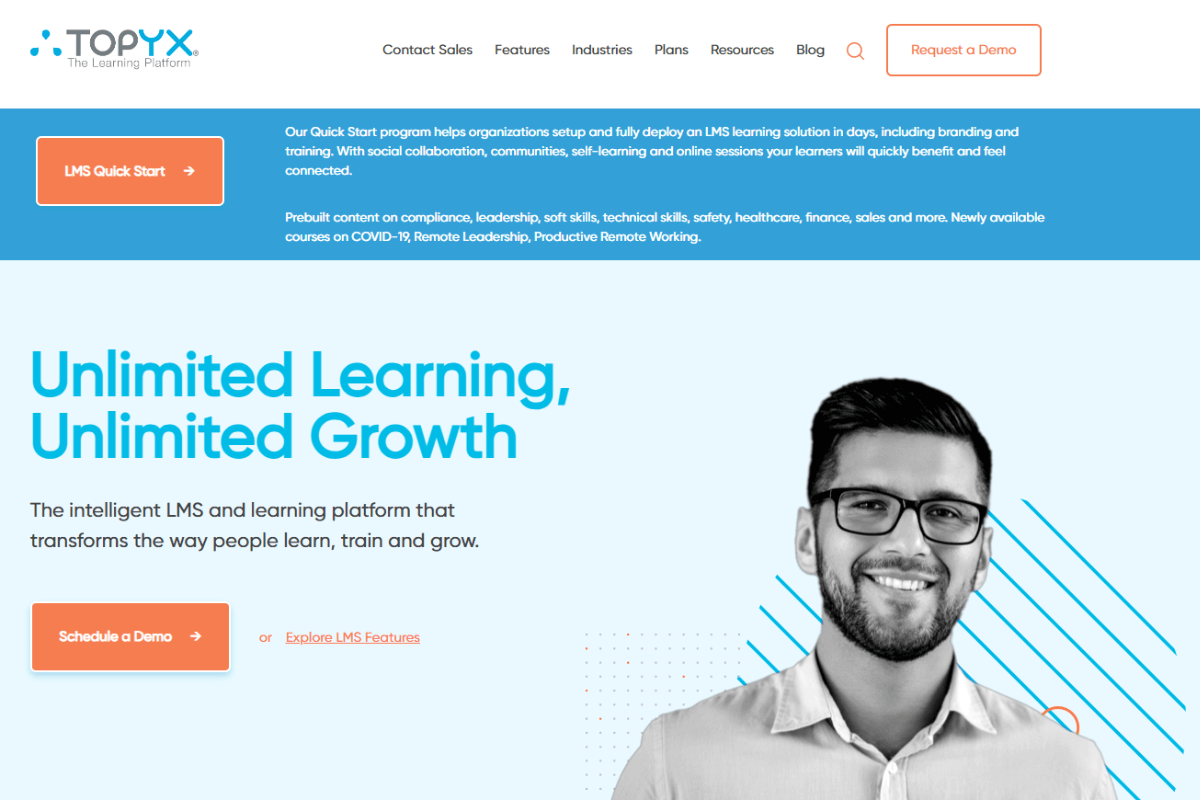
- SCORM & xAPI Support: integrating eLearning standards to share and track courses across multiple LMS systems
- Customizable learning paths: tailoring each healthcare provider’s courses
- Mobile-friendly interface: enabling medical staff to learn anytime, anywhere
- Collaborative learning tools: Providing forums, chat rooms, and collaboration tools for knowledge and experience sharing among healthcare personnel.
3. Totara Learn
Totara Learn is also a tool that medical centers can use to provide courses and skills needed in the industry. Like other healthcare learning management system software, Totara also features tailored learning programs that personalize each staff’s learning path. Besides, the system supports competency-based training, helping to monitor and assess the skills of healthcare workers to ensure they meet professional standards. Additionally, other features of Totara Learn include compliance management, performance management integration, a mobile-responsive interface, and multi-tenancy. Below are some benefits of Totara Learn for healthcare organizations.
- Streamlining compliance
- Personalizing learning
- Improving staff performance
- Reducing training cost
- Customizing and extending easily
4. EthosCE
Unlike other LMS software, EthosCE is a healthcare learning management system designed specifically for the healthcare industry. It focuses on providing continuing medical education (CME) and certifications. This is an ideal choice for organizations that need to manage intensive training processes and comply with medical standards. Here are some main features of this software.
- CME/CE tracking and reporting
CME/ CE tracking and reporting is an outstanding feature of EthosCE. This feature helps healthcare organizations effectively manage the continuing education process for healthcare professionals. The system will track, record training time, and store personal records. Besides, it provides detailed reports on learning processes, and automatically issues certification.
- E-commerce integration
E-commerce integration in EthosCE makes it easy for healthcare organizations to access the online training market. They can create a stable source of income from courses while managing finances and students professionally.
- Automated certificate management
Automated certificate management in the EthosCE healthcare learning management system simplifies and automates the process of issuing certificates to learners after they complete a course.
5. Litmos
Litmos is a healthcare learning management system that many healthcare organizations choose to manage their employee training and development. It helps deliver courses, track learning performance, and manage training automatically and easily. Here are some main features of Litmos.
- Pre-built course library
Litmos offers a pre-built course library covering a wide range of healthcare-related topics. They can be regulatory compliance, patient safety, and professional skills development.
- SCORM and xAPI Support
The system supports eLearning standards like SCORM and xAPI. This helps to integrate courses from multiple sources.
- Gamification
Litmos integrates gamification elements. They are reward points, leaderboards, and badges, which help increase employee engagement and motivation to learn.
- Reporting and analytics
The system provides detailed reports on learning progress, compliance status, and training effectiveness. This makes it easy for healthcare organizations’ managers to track the development of their staff.
6. HealthStream
HealthStream is a healthcare learning management system focusing on managing training and compliance for healthcare professionals. With features optimized for healthcare environments, HealthStream helps healthcare organizations ensure quality patient care and enhance the professional skills of their staff.
With specialized content on patient safety and quality of care, HealthStream helps organizations maintain high standards in healthcare delivery. Thanks to the system, medical centers can manage compliance effectively, ensuring all employees meet certification requirements. The system’s integration with clinical systems and reporting automation saves organizations time and effort in managing training and certification. Whether you are operating a large hospital or a small medical facility, HealthStream is scalable to fit all the needs and sizes of your organization.
7. Relias
Relias is among the leading healthcare learning management system platforms focused on training, competency assessment, and regulatory compliance for healthcare organizations.
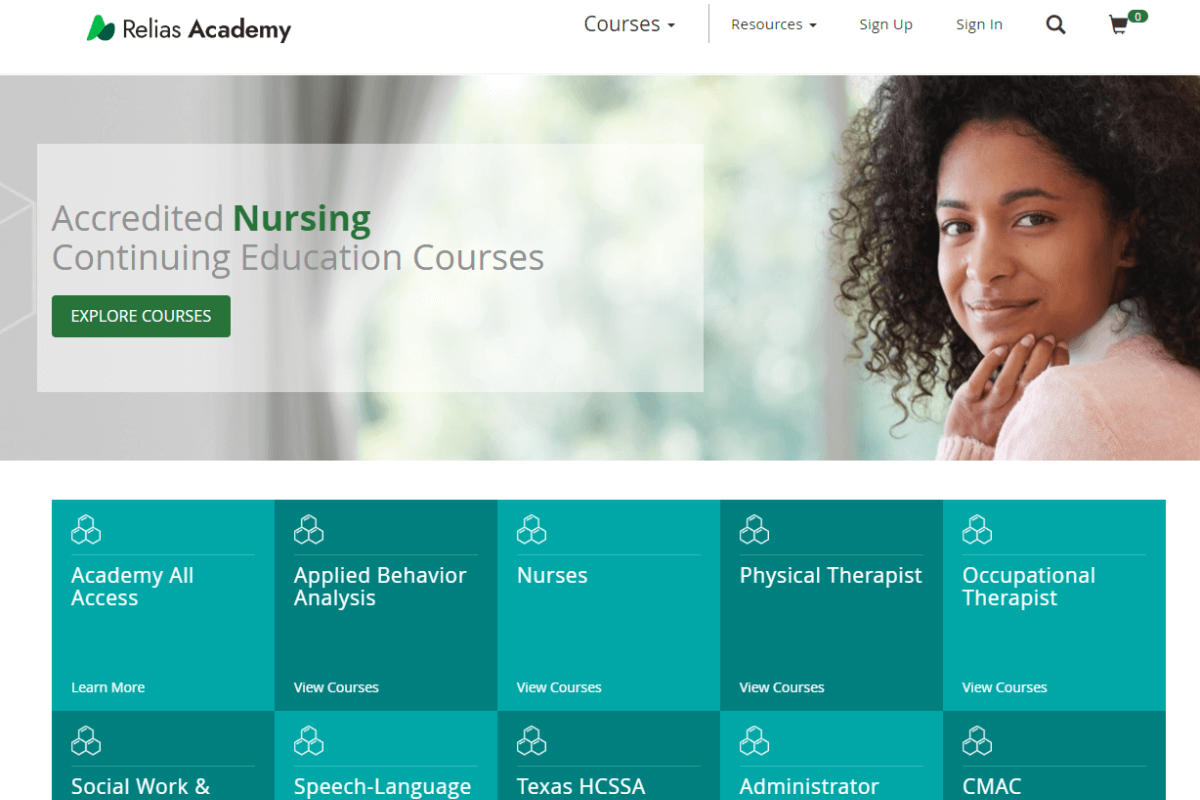
The system provides comprehensive tools and solutions to manage and develop healthcare workforce skills, from long-term care to hospitals, home care facilities, and many other healthcare sectors. Relias makes it easy for organizations to manage training and comply with regulations by providing up-to-date training content, automating certification tracking, and ensuring every employee completes the necessary requirements.
With the ability to train staff in professional skills and patient safety, the system contributes to improving the quality of patient care and minimizing medical risks. It can be said that Relias is a comprehensive healthcare learning management system solution that helps healthcare organizations optimize training processes.
8. Docebo
Among the healthcare learning management system software, Docebo is also outstanding with all the features integrated on one website. The platform prioritizes learner needs and leverages AI-powered learning algorithms to personalize the learning experience. Here are some main features of the Docebo platform.
- API support, gamification, multilingual support, and location:
API allows the healthcare learning management system to integrate with EHRs and HMS. The gamification function simulates medical situations, and multilingual support helps healthcare organizations access and understand the multilingual environment.
- Ability to personalize for each learner
The ability to personalize for each other enables healthcare facilities to customize learning content so that medical staff can develop professional skills. Besides, this software also trains learners according to individual needs and integrates individual feedback and evaluation.
III. How to Select the Right Medical Learning Management System
Selecting the right healthcare learning management system is extremely important for clinics to optimize staff training. A suitable system can provide customized learning paths, manage certifications, and enhance healthcare providers’ knowledge and skills effectively. Let’s find out some factors to consider picking an ideal LMS for healthcare with Adamo Software!
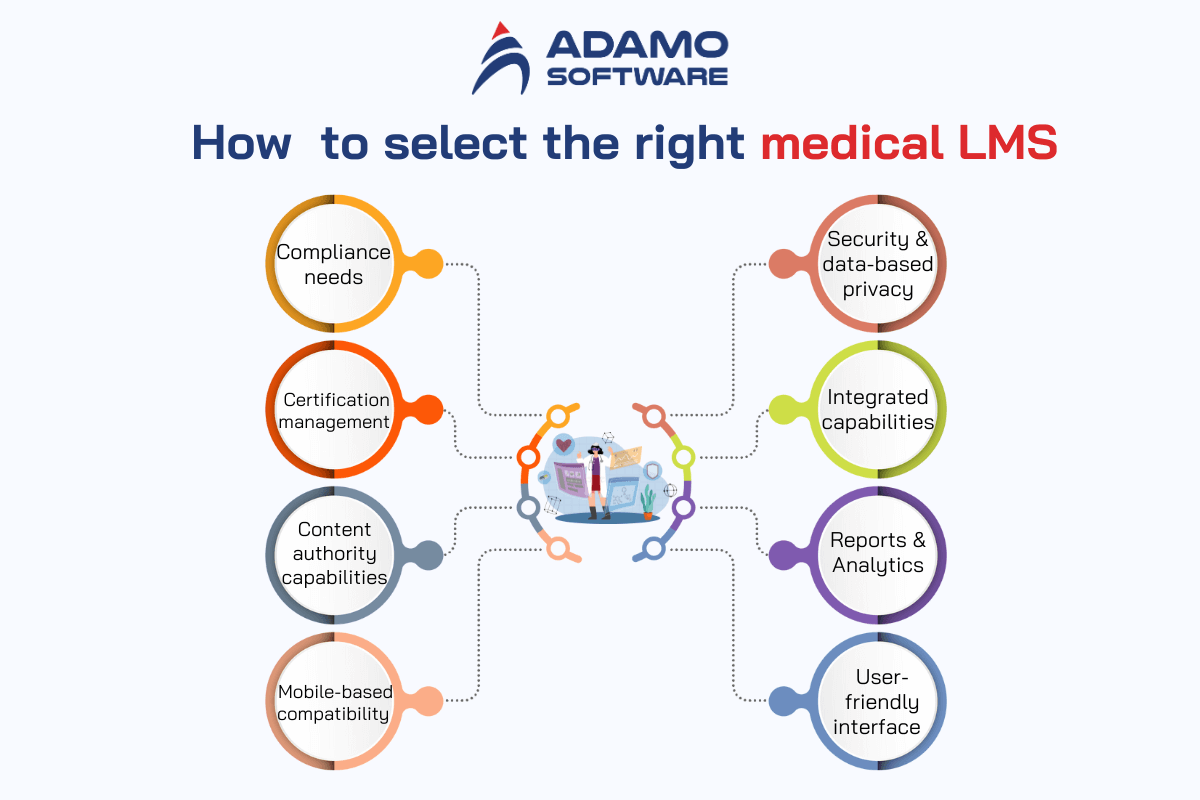
1. Compliance needs
Compliance need is one of the important considerations when choosing the healthcare learning management system software. This helps to ensure that the medical centers and all healthcare workers fully comply with legal regulations and industry standards. Choosing the right LMS that can ensure compliance not only helps minimize legal risks but also improves the quality of healthcare staff training and development.
A good healthcare learning management system must support employee training according to regulatory standards such as HIPAA, OSHA, or continuing education requirements for healthcare staff.
Besides, the system must be able to track, store, and report on employee learning progress and certifications. Additionally, the system should have the ability to automatically update new regulations to ensure that training content always reflects current healthcare industry requirements.
2. Certification management
Certification management feature is essential for a healthcare learning management system to ensure that employees consistently meet training requirements and maintain certifications necessary for their roles. Using certificate management features in an LMS helps reduce administrative burden, ensure compliance, and improve the efficiency of human resource management in the healthcare environment. LMS can automatically track employee certifications, record issue dates, expiration dates, and update requirements. Thanks to this, healthcare staff will not miss any required training or exams.
3. Content authority capabilities
The content authorization feature in a healthcare learning management system allows healthcare organizations to control and approve learning content before it is released for use. This feature is critical to ensuring that the materials and courses delivered to healthcare professionals are relevant, accurate, and compliant. Some aspects of content authority capabilities include moderation and approval, decentralized content management, and regulatory compliance assurance.
4. Mobile-based compatibility
In the healthcare field, employees often must work in mobile and flexible environments. Therefore, mobile-based compatibility has become an indispensable feature of the healthcare learning management system. A mobile-friendly LMS offers these benefits below.
- Enabling healthcare staff to learn anytime, anywhere
- Creating mobile-friendly interface
- Providing quick updates
- Saving time
In general, this feature makes the LMS system more flexible, meeting the learning needs of medical staff conveniently and effectively.
5. Security and data-based privacy
Security and data-based privacy are major factors in the healthcare learning management system. This helps to ensure that sensitive employee and patient information is always protected. Data encryption is a crucial aspect of this factor. All data, including personal information and learning information of medical staff, must be encrypted when stored and transmitted, ensuring that data is not accessed illegally during information exchange. Besides data encryption, the LMS must have a strict access authorization mechanism. This helps minimize the risk of security breaches due to unauthorized access.
6. Integrated capabilities
Integrated capabilities in the healthcare learning management system allow the system to connect and work in sync with other tools and systems. The LMS can connect with patient record management systems to synchronize data, track training requirements related to patient care, and update training information based on staff medical records. Besides Electronic Health Records, the LMS should integrate the human resource management system to synchronize employee information.
7. Reports and Analytics
Reports and Analytics is an important feature in a learning management system for healthcare. This factor includes the features below.
- Custom reports
The healthcare learning management system allows for the creation of custom reports based on the specific needs of the organization. They can be reports on employee learning progress, test results, certification status, and course completion. These reports help managers quickly grasp important information and make data-driven decisions.
- Analyzing training effectiveness
The analytics tools in the LMS provide insight into the effectiveness of training programs. This helps identify areas for improvement and assess the impact of training on job performance.
- Tracking progress and certifications
The reporting system is capable of tracking the training progress of each employee and updating their certification status. Besides, it also helps to detect early issues with expiring certifications or additional training requirements.
8. User-friendly interface
User-friendly interface is also an important factor in healthcare learning management systems. A user-friendly interface improves user experience and enhances training efficiency. The software’s interface must be clearly designed with icons, menus, and navigation elements arranged logically. This makes it easy for users to find and access the features and documentation they need without difficulty. Besides, the software’s interface should have a search button that enables users to quickly find the courses, documents, or information they need.
Overall, the above factors help improve training effectiveness and ensure that the system meets the specific requirements of the healthcare industry, from information security to providing a convenient and flexible learning experience. Choosing an LMS that fits these criteria will help healthcare organizations optimize training processes, maintain regulatory compliance, and improve the quality of patient care.
Also read: 15+ Best learning management system to look for in 2024 and beyond
IV. Why Choose Adamo to Build Your Custom Healthcare LMS Solutions?
If you are looking for a partner to help you build your custom healthcare learning management system, Adamo Software can be an ideal choice. As a top leader in providing technology solutions in Vietnam, we guarantee that we can meet your requirements and expectations.

Adamo Software offers a flexible healthcare learning management system with advanced features. They include certificate management, data security, and mobile support. With an experienced and knowledgeable team, we are committed to providing support and customization to ensure that your LMS not only functions effectively but also enhance the training and development of your staff. Here’s how we can help you with your healthcare LMS software development.
- Customized solution
Adamo provides customized learning management system solutions for the healthcare industry. We ensure that every clinic’s specific needs will be perfectly met.
- Applying advanced technology
Adamo applies advanced technology to optimize LMS solutions for the healthcare industry. This helps to enhance the system’s features and security and improve the user experience and training effectiveness in the healthcare environment.
- Long-term support and sustainable development
We are committed to providing long-term support and sustainable development for your healthcare LMS solution. Adamo’s ongoing support and sustainable development strategies help maintain high performance and respond promptly to changes in the needs and requirements of the healthcare industry.




